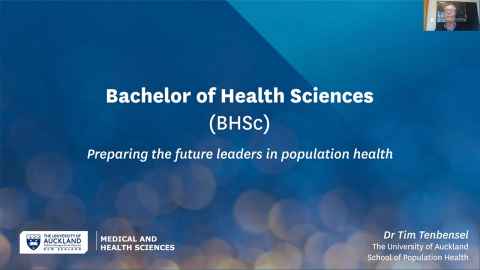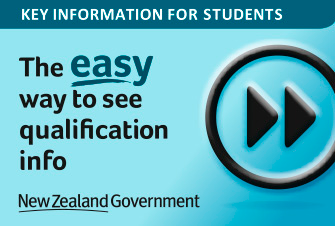Programme overview
If you have a broad interest in public health, and especially if you're passionate about addressing social problems, then our Bachelor of Health Sciences (BHSc) is a great place to start your journey.
Our unique programme builds multidisciplinary understanding of health and healthcare in Aotearoa New Zealand - blending deep insights into the biological, social, cultural, and behavioural dimensions of health and illness.
Programme highlights:
- Great prospects for employment in the public, private or community non-profit sector
- A pathway into undergraduate clinical programmes in Medicine and Pharmacy
- A work placement experience with a health employer in your final year of study
- Insights into social, cultural, environmental, behavioural, and biological understandings of wellness and ill-health
- Opportunities for overseas study, internships and experiential learning

Conjoint programmes let you pursue two undergraduate bachelors degrees at the same time.
Learn more about conjointsProgramme structure
- This is a three year degree (360 points)
- In your first year (Stage I) you will study a combination of core courses in population health and health systems (120 points)
- You have a selection of elective courses you can choose from the Bachelor of Health Sciences Schedule (120 points)
- For your second and third years (Stage II-III), you can either pursue a generic BHSc degree or choose from one of our career pathways that will allow you to focus on a particular subject.
- Health Promotion
- Mental Health and Addictions
- Population Health Nutrition
- Health Systems
- Health Information and Analysis
You can check out our degree planners to see how you can structure your degree for each pathway.
Most students need to take one General Education course.
Students should also be aware of the University’s Academic English Language Requirement.
Sample programme structure
Yr1 Med 120 points
-
- Code:
- POPLHLTH 101
- Name:
- Introduction to Health Systems
- Type:
- Compulsory core course
- Points:
- 15 pts
-
- Code:
- POPLHLTH 102
- Name:
- Social Determinants of Health
- Type:
- Compulsory core course
- Points:
- 15 pts
-
- Code:
- POPLHLTH 111
- Name:
- Population Health
- Type:
- Compulsory core course
- Points:
- 15 pts
-
- Code:
- HLTHPSYC 122
- Name:
- Behaviour, Health and Development
- Type:
- Compulsory core course
- Points:
- 15 pts
-
- Code:
- BIOSCI 107
- Name:
- Biology for Biomedical Science: Cellular Processes
- Type:
- Compulsory core course
- Points:
- 15 pts
-
- Code:
- CHEM 110
- Name:
- Chemistry of the Living World
- Type:
- Compulsory core course
- Points:
- 15 pts
-
- Code:
- MEDSCI 142
- Name:
- Biology for Biomedical Science: Organ Systems
- Type:
- Compulsory core course
- Points:
- 15 pts
-
- Code:
- WTRMHS 100
- Name:
- Waipapa Taumata Rau
- Type:
- Core course
- Points:
- 15 pts
Yr1 NonMed 120 points
-
- Code:
- POPLHLTH 101
- Name:
- Health Systems 1
- Type:
- Compulsory core course
- Points:
- 15 pts
-
- Code:
- POPLHLTH 102
- Name:
- Health and Society
- Type:
- Compulsory core course
- Points:
- 15 pts
-
- Code:
- POPLHLTH 111
- Name:
- Population Health
- Type:
- Compulsory core course
- Points:
- 15 pts
-
- Code:
- HLTHPSYC 122
- Name:
- Behaviour, Health and Development
- Type:
- Compulsory core course
- Points:
- 15 pts
-
- Name:
- Stage I course
- Type:
- Elective course
- Points:
- 15 pts
-
- Name:
- Stage I course
- Type:
- Elective course
- Points:
- 15 pts
-
- Name:
- Stage I course
- Type:
- Elective course
- Points:
- 15 pts
-
- Code:
- WTRMHS 100
- Name:
- Waipapa Taumata Rau
- Type:
- Core course
- Points:
- 15 pts
Year 2 120 points
-
- Code:
- POPLHLTH 202
- Name:
- Research Methods in Health
- Type:
- Compulsory core course
- Points:
- 15 pts
-
- Code:
- POPLHLTH 204
- Name:
- Health Care Ethics
- Type:
- Compulsory core course
- Points:
- 15 pts
-
- Code:
- POPLHLTH 210
- Name:
- Equity and Inequalities in Health
- Type:
- Compulsory core course
- Points:
- 15 pts
-
- Code:
- MAORIHTH 201
- Name:
- Introduction to Maori Health
- Type:
- Compulsory core course
- Points:
- 15 pts
-
- Code:
- POPLHLTH 216
- Name:
- Quantitative Methods in Health
- Type:
- Compulsory core course
- Points:
- 15 pts
-
- Name:
- Stage II or III course
- Type:
- Elective course
- Points:
- 15 pts
-
- Name:
- Stage II or III course
- Type:
- Elective course
- Points:
- 15 pts
-
- Type:
- General Education course
- Points:
- 15 pts
Year 3 120 points
-
- Code:
- POPLHLTH 300
- Name:
- Health Sector Professional Competencies
- Type:
- Compulsory core course
- Points:
- 15 pts
-
- Code:
- POPLHLTH 302
- Name:
- Health Service Placement
- Type:
- Compulsory core course
- Points:
- 15 pts
-
- Code:
- one of
- Name:
- MAORIHTH 301, POPLHLTH 312, 313
- Type:
- Compulsory core course
- Points:
- 15 pts
-
- Code:
- one of
- Name:
- POPLHLTH 301, 303, 304, 311, 316
- Type:
- Compulsory core course
- Points:
- 15 pts
-
- Code:
- one of
- Name:
- MAORIHTH 301, POPLHLTH 301, 305–307, 311–316, STATS 330
- Type:
- Compulsory core course
- Points:
- 15 pts
-
- Name:
- Stage II or III Course
- Type:
- Elective course
- Points:
- 15 pts
-
- Name:
- Stage II or III Course
- Type:
- Elective course
- Points:
- 15 pts
-
- Name:
- Stage II or III Course
- Type:
- Elective course
- Points:
- 15 pts
Subjects available in this programme
2025 entry requirements
My highest qualification is from:
Secondary school qualifications
If you're joining us from secondary school, here's what you need to enter the programme.
You are guaranteed entry to this programme if you meet these requirements.
- First, you must meet the University Entrance (UE) standard.
- You must also meet the rank score for this programme. Not sure about your rank score? Use our rank score calculator.
- You may need to have studied certain subjects or achieved credits in particular subjects.
- Some programmes have additional requirements, such as an interview, portfolio or references.
Guaranteed rank score, subject and other requirements
If your rank score is slightly lower than the guaranteed score, we encourage you to still apply. We will consider your application if places are available. If you don’t meet the requirements, you may be able to apply under our Undergraduate Targeted Admission Schemes.
-
QualificationNCEA National Certificate of Educational AchievementScore required250
- Minimum of 18 credits at Level 3 in one of English, Geography, History, Classical Studies, History of Art, Te Reo Māori (or Te Reo Rangatira) or Social Studies and a minimum of 18 credits at Level 3 in one of Biology, Chemistry or Physics
-
QualificationCIE Cambridge International ExaminationsScore required300
- One of English, Geography, History, Classical Studies and one of Biology, Chemistry or Physics at full A Level
-
QualificationIB International BaccalaureateScore required33
Read more about entry requirements for New Zealand secondary school applicants.
Further requirements
To find out more about entry requirements, visit our Undergraduate Prospectus page.
Tertiary qualifications
If you've studied at a tertiary institution, here's what you need to enter the programme.
You can transfer from another tertiary institution, or another University of Auckland qualification, if you meet these requirements.
Minimum grade requirements
Minimum requirements listed here are the likely grades required and do not guarantee entry. We assess each application individually and applicants may require a higher grade to be offered a place. You can also gain entry if you have met the guaranteed entry requirements through New Zealand or Australian secondary school qualifications, which must have been completed within the last year.
-
Grade requiredGPA Grade Point Average 5.0
-
Grade requiredGPE Grade Point Equivalent 5.0
Further requirements
You must have a minimum of one semester (usually 6 months) of full-time study in an undergraduate degree programme from a recognised university (or similar institution), with a minimum GPA or GPE of 5.0 or higher, either across your last semester of full-time study, or across your entire degree so far.
A rank order will then be established based on academic performance (based on GPA). Places will be offered to the highest ranking applicants until the programme limit is reached.
The number of places available is dependent on the number of places filled by school leaver, Certificate of Health Sciences, and Tertiary Foundation Certificate applicants, who are guaranteed a place if they meet the requirements.
Transfer of Credit - You can apply for transfer of credit for tertiary courses completed elsewhere as part of your application to the University of Auckland. For more information, please see External transfer of credit.
If you have completed study at another New Zealand University, get an estimate of the transfer credit you may be eligible for, using our Transfer Credit Calculator.
Other pathways to study
You could be eligible for another programme, or check out these alternative pathways:
- See if you meet the criteria for the Undergraduate Targeted Admission Scheme (UTAS).
- Bridge your educational gap with a preparation and foundation programme.
- If you are under 20, have no formal University Entrance (UE) qualification, and are a New Zealand or Australian citizen or permanent resident you can apply for discretionary entrance.
- If you can demonstrate outstanding academic achievement and maturity, we offer admission to applicants under 16.
- You can gain entry to the BHSc if you complete the Certificate of Health Sciences with a GPA of 4.5 or higher.
- You can gain entry to the BHSc if you complete the Tertiary Foundation Certificate with a GPA of 5.5 or higher.
My highest qualification is from this country or region:
Secondary school qualifications
If you're joining us from secondary school, here's what you need to enter the programme.
You need to have one of the following:
- International Baccalaureate Diploma with a minimum total score of 24.
- General Certificate of Education (GCE) Advanced Level. You must have completed a minimum of three A-Level subjects.
- Cambridge International Examinations (CIE). You must have completed a minimum of three A-level subjects.
GCE ‘A’ Level requirements apply to ‘A’ Level qualifications examined by bodies such as AQA, OCR, Edexcel, WJEC, CCEA and Pearson Education Limited taken outside of New Zealand.
Minimum grade, subject and other requirements
Minimum requirements listed here are the likely grades required and do not guarantee entry. We assess each application individually and applicants may require a higher grade to be offered a place. Your CIE/GCE A level score is calculated on the best three academic subjects and General Studies cannot be included.
-
QualificationIB International Baccalaureate DiplomaScore required33QualificationIELTS Academic International English Language Testing SystemScore required6.5
No bands less than 6.0.
-
QualificationGCE A Level/CIE General Certificate of Education Advanced LevelScore requiredABBQualificationIELTS Academic International English Language Testing SystemScore required6.5
No bands less than 6.0.
Tertiary qualifications
If you've studied at a tertiary institution, here's what you need to enter the programme.
You can transfer from another tertiary institution if you meet these requirements.
You need to have the following:
One year successful bachelor-degree level study at a recognised university (or similar institution) overseas.
Minimum grade requirements
These are the likely grades required, but they do not guarantee entry. Applicants may require higher grades to gain entry to this programme.
-
Grade requiredGPE Grade Point Equivalent 5.0
-
QualificationIELTS Academic International English Language Testing SystemScore required6.5
No bands less than 6.0.
Other pathways to study
You could be eligible for another programme, or check out these alternative pathways:
- Bridge your educational gap with a preparation and foundation programme.
- If you have an offer of place from us that is conditional on meeting English language requirements, you may be considered for English Pathway courses from the University of Auckland English Language Academy (ELA)
- You can gain entry to the BHSc if you complete the University of Auckland Certificate in Foundation Studies at Academic Colleges Group (ACG) with an overall score of 270 or higher in four subjects, including one science subject.
- You can gain entry to the BHSc if you complete the Auckland Foundation Year at Taylors College (Auckland) with an overall score of 310 or higher, including one science subject.
How much does a Bachelor of Health Sciences cost per year?
2025 fees
- Domestic students
- NZ$9,326.40*
- International students
- NZ$40,780*
Fees are set in advance of each calendar year and will be updated on this website. Fees are inclusive of 15% GST, but do not include the Student Services Fee, course books, travel and health insurance, or living costs. Amounts shown are indicative only. In addition to the tuition fees, there is a Student Services Fee of $9.24 per point, estimated at $1,108.80 for full-time study (120 points). Fees will be confirmed upon completion of enrolment into courses.
*Please note: amounts shown are indicative and estimates only.
Find out about financial support information
Scholarships and awards
Find out about the scholarships you may be eligible for.
Student loans and allowances
Are you a New Zealand citizen or resident? You could be eligible for a student loan or allowance.
Cost of living
Get an idea of how much accommodation and general living in Auckland will cost.
Key dates
The Semester Two start date is not available for those wanting to apply for Medicine or Pharmacy through the First Year entry category.
Please note: We will consider late applications if places are still available. International students should start the application process as early as possible to allow sufficient time to apply for a visa.
Application closing dates
- Semester One 2025
- 8 December 2024
Start dates
Here are the start dates for the programme.
| Semester One | Starts – 3 March |
|---|---|
| Ends – 30 June | |
| Semester Two | Starts – 21 July |
| Ends – 17 November |
| Semester One | Starts – 2 March |
|---|---|
| Ends – 29 June | |
| Semester Two | Starts – 20 July |
| Ends – 16 November |
Other important dates
See important dates for the academic year, including orientation, enrolment, study breaks, exams, and graduation.
How to apply
Applying for an undergraduate programme? Check out our step-by-step guide.
Graduates of the Bachelor of Health Sciences in the School of Population Health will be able to make a difference to the health and wellbeing of populations because of their skills, knowledge and experience in the following areas.
Disciplinary Knowledge and Practice
1.1 Explain factors that affect the health and wellbeing of whole populations including (1) social, political, economic, environmental and cultural determinants and (2) the leading causes of morbidity, mortality and the potential for disease, disability and injury prevention.
1.2 Evaluate significant conceptual theories and apply current models and methodological approaches in the health sciences to address inequity and improve the health and wellbeing of populations.
Critical Thinking
2.1 Contest knowledge and practice, ideas and research, drawing on multiple sources and perspectives, to engage in reflective practice about health inequalities, inequities and outcomes.
2.2 Locate and evaluate information, and analyse qualitative and quantitative data about health, to construct reasoned arguments and interpretations.
2.3 Engage in a continuous process of reflection on one’s own practice and actively participate in self-audit, including in respect of the Treaty of Waitangi/Te Tiriti o Waitangi.
Solution Seeking
3.1 Form and evaluate research strategies, including developing research questions, and discern and assess possible methods for answering them.
3.2 Apply disciplinary theory, analysis, research and creative skills in seeking solutions to complex health problems and inequities.
3.3 Take a systems-based approach to designing responses to challenges in health, health systems and society.
Communication and Engagement
4.1 Use, manage, present and communicate information effectively using clear English and/or te reo Māori in a range of media and formats.
4.2 Demonstrate understanding of self in relation to others, reflecting on one’s own and others’ world viewpoints and principles of cultural safety.
4.3 Build and enable respectful and sustainable collaborative relationships to improve health within diverse communities.
Independence and Integrity
5.1 Recognise the responsibilities associated with autonomous academic inquiry and engage in scholarship respectfully and constructively.
5.2 Identify the ethical dimensions of contexts, actions and policies and draw upon ethical theory to formulate and justify principled responses.
5.3 Navigate personal, academic and professional challenges with integrity, taking responsibility for academic and professional decisions and conduct.
Social and Environmental Responsibilities
6.1 Demonstrate a commitment to practice in accordance with the Treaty of Waitangi/Te Tiriti o Waitangi in the context of improving indigenous health and upholding indigenous rights.
6.2 Appraise national and global dimensions of intellectual, political, environmental, and economic activities affecting health.
6.3 Lead and be advocates of health in diverse community, including accepting social and civic responsibilities.
Where could this programme take you?
Employers in both the public and private sectors seek our graduates. Our BHSc opens up a range of exciting career opportunities in the health and social sectors, including the roles listed below.
Jobs related to this programme
- Policy analyst
- Health services manager
- Health promoter
- Health researcher
- Health services consultant
- Business development manager
- Health economist
- Community addictions counsellor

After being pulled towards two potential career paths, Huma was delighted to find she could pursue both at the University of Auckland.
Read moreStudent career planning service
Once you become a student at the University, you can get help with planning and developing your career from Career Development and Employability Services.
Postgraduate study options
The School of Population Health offers a range of postgraduate courses that are available.
We advise that the University of Auckland is not involved in the employment of graduates and can make no guarantee of post-qualification registration or employment in New Zealand or any other country.
Experience the University

Study pathways in health sciences
The BHSc offers five specialised pathways, which can lead to a range of rewarding careers.
Do you need help?
Can’t find the answer in AskAuckland?
Need to speak to someone?
You can phone us directly.
- Auckland
- 923 5025
- Outside Auckland
- 0800 61 62 63
- International
- +64 9 373 7513


